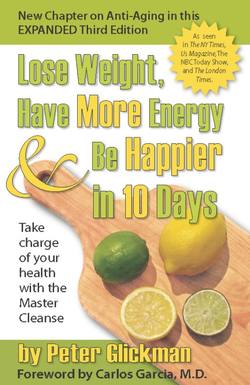Читать книгу Lose Weight, Have More Energy and Be Happier in 10 Days - Peter Glickman - Страница 7
На сайте Литреса книга снята с продажи.
ОглавлениеForeword
Health care reform is a gargantuan issue facing not just the U.S. but also the entire world. I, too, believe that our system is broken and in need of change. However, I think Washington is barking up the wrong tree. They are busy arguing about coverage and access for the current “sick care” system when what the country truly needs is “health care” reform: reform that shifts the focus from a symptom-suppression model of sick care to one of prevention, wellness and the elimination of unnecessary drugs.
Ironically, Washington appears to mirror the problems that exist in Western Medicine. Sick care treats symptoms instead of dealing with the root causes of disease. Western medicine is not the medicine of the future because it does not address why we are unhealthy and how to change. If we do not change why we are unhealthy, we will continue to be unhealthy and we will remain economically distressed. To provide better health care, to become a healthier nation, we have to make serious changes. We will only flourish when we address the root causes of the problems.
For 2,200 years until 1805, medicine was practiced exclusively according to the ancient Greek physician Hippocrates (460-377 BC), the founding father of natural medicine. He taught that the first and foremost principal of medicine must be to respect nature’s healing forces, which inhabit each living organism. Thus you are the only person who can cure yourself. Healers only assist. Hippocrates considered illness a natural phenomenon that forced people to discover the imbalances in their health. He strongly believed in good food and related the course of any disease to poor nutrition and bad eating habits. He taught, “Let food be your medicine and medicine be your food,” advice that, to this day, has not lost its validity.
During the 1800s, a new school of medicine emerged: the allopathic school (using drugs to suppress the symptoms of a disease) or Western school, based on patentable drugs. The idea behind it was that doctors can cure, provided they have the correct technology and drugs. During this era, there were more homeopathic doctors (using natural substances to cure the disease) than allopathic ones, as they were preferred. However, by the 1920s, there was only one homeopathic school remaining. Motivated by profit and through legislative maneuvering, pharmaceutical giants ensured allopathic medical dominance, while ignoring the first rule of medicine: first do no harm. Thus, today we are offered drugs that treat depression with a side effect of suicide!
The reality is that medicine has failed to evolve while people are demanding change. No one seems to get well and cries from consumers fall upon deaf ears.
So, unfortunately, it is left up to you to navigate our unfortunate system of sick care. So for those seeking assistance, I relate a fact known for several thousand years: most illness comes from the colon. Few remember that at one time, colon therapists were an integral part of the general medical practice in America. Dr. John H Kellogg published: “Should the colon be sacrificed or may it be reformed?” in the Journal of the American Medical Association, Vol. 26 in 1917. After this publication, colon therapy grew in popularity in America until the invention of colonoscopy. Keeping your colon clean and healthy was replaced with simply looking at it.
As part of prevention, keeping your colon clean and healthy is of prime importance. That is one of the reasons the Master Cleanse is a great tool for those seeking prevention of illness and I respect Peter for doing a great job of not only explaining what to do, but also sharing with you others’ experiences and support. Great health does not have to be expensive.
When I started my clinic, Utopia Wellness, I was tired of issuing bandaids in an effort to treat symptoms. I had to teach myself that real medicine is more than just technology and drugs. I became a physician because I wanted to help people find remedies for their problems. I wanted it to serve as a model for this necessary change in health care, where just about any disease is addressed naturally. We stress prevention, not intervention or sick care. Sick care is ineffective and expensive.
Perhaps someday, individuals who understand real health care for our nation may represent WE THE PEOPLE. In the mean time, you had better learn how to prevent illness, since there appears to be little profit for others to do so.
Carlos M. Garcia, M.D.
www.UtopiaAwaits.com
